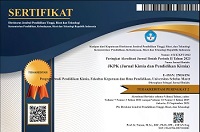The Science Learning Material Using PjBL Model Integrated with Science, Technology, Engineering, and Mathematics (STEM) Approaches to Enhance Students' Communication Skills
Abstract
This study aims to develop a science learning material using PjBL model integrated STEM approaches to enhance students' communication skills. The method used is the 4D Research and Development (R&D) model and an experimental method for testing the effectiveness of the device. The study population was all VII class in one of the junior high schools in the South Tangerang region with samples taken using a random sampling technique of 76 people. The instrument used was a device feasibility test sheet and an observation skill communication sheet. The data obtained were then analyzed quantitatively and qualitatively. The results showed the components of the learning device in the form of syllabus, lesson plans, teaching materials and student worksheets, were very feasible to use with an average of 3.62. In addition, each item validity assessment instrument is also declared valid for use. The observed communication skills also increased from 1.59 to 3.15 with a gain value of 0.64 (medium category) for the experimental class. Meanwhile, the gain value for the control class is 0.005 (very low category). The difference in the gain value indicates that the learning device is effective in improving students' communication skills.
Keywords
Full Text:
PDFReferences
A. Isthofaina. "Evaluasi Program Pelatihan Soft Skill Mahasiswa: Pen-dekatan Experimental Research." JBTI: Jurnal Bisnis: Teori dan Imple-mentasi, vol.1, no.2, pp. 207-218, 2010.
E. Alhadi, “Pentingnya Peningkatan Soft Skill dalam Lingkungan Kerja”, J. Adm Niaga, vol. 1, no. 2, pp. 34-40, 2014.
D. Suryanto, K. Waras & Sutrisno, “Relevansi Soft Skill Yang Dibutuhkan Dunia Usaha/ Industri Dengan Yang Dibelajarkan Di Sekolah Menengah Kejuruan”, J. Tekn. dan Kej. vol. 36, no. 2, pp. 107-118, 2013.
M. U. Manara, “Hard Skills dan Soft Skills pada Bagian Sumber Daya Manusia di Organisasi Industri”, J. Psi. Tabularasa, vol. 9, no. 1, pp. 37-47, 2014.
E. Wiyanti, Y. Wardani, & S. H. Ujiningtyas, “Kebutuhan Layanan Kesehatan Tentang Soft Skills Lulusan Diploma Tiga Keperawatan di Indonesia”, J. Kep. Sriwijaya, vol. 4, no. 1, pp. 23-32, 2017.
S. Suprayitno, “Pengaruh Disiplin kerja,lingkungan kerja dan motivasi kerja terhadap kinerja karyawan pada Sub Dinas kebersihan dan tata kota DPULLAJ”, J. Man. SDM., vol. 2, no. 1, pp. 23-34, 2017.
D. Kokotsaki, M. Victoria, & W. Andy, "Project-based learning: A review of the literature.", Improving schools, vol.19, no.3, pp.267-277, 2016.
D. A. B. Lestari, A. Budi, & D. Teguh, ”Implementasi LKS dengan Pendekatan Science, Technologi, Engineering, and Mathematics (STEM) untuk Meningkatkan Kemampuan Berpikir Kritis Siswa”. J. Pen. Fisika dan Tek., vol 4. no. 2, pp. 202-207, 2018.
J. Afriana, A. Permanasari, & A. Fitriani, “Project Based Learning Integrated to STEM to Enhance Elementary School’s Students Scientific Literacy” J. Pend. IPA Indonesia, vol. 5. no. 2, pp. 261-267, 2016.
S. Bell, “Project-based learning for the 21st century: Skills for the future,” The Clearing House, 83, pp. 39-43, 2010.
DOI: 10.1080/00098650903505415
D. Herro & C. Quigley, “Innovating with STEM in Middle School Classroom: Remixing Education.” On the Horizon, vol. 24, no. 23, pp. 190-204, 2016.
S. Han, B. Yalvac, M .M. Capraro, & R. M. Capraro, “In-service Teachers’ Implementation and Understanding of STEM Project Based Learning.” Eurasia Journal of Mathematics, Science & Techmology Education, vol. 11, no. 1, pp. 63-76, 2015.
DOI: 10.12973/eurasia.2015.1306a
J. Radloff & S. Guzey, “Investigating Preservice STEM Teacher Conceptions of STEM Education”: Journal of Science Education and Technology, vol. 25, no. 5, pp. 759-774, 2016.
DOI: 10.1007/s10956-016-9633-5
G. T. Yakman & H. Lee, “Exploring the Exemplary STEAM Education in the US as a Practical Educational Framework for Korea.” Journal of Korea Association Science Education, vol. 32, no. 6, pp. 1072-1086, 2012.
DOI: 10.14697/jkase.2012.32.6.1072
S. J. Lou, R. C. Shih, C. R. Diez, & K. H. Tseng, “The Impact of Problem-Based Learning Strategies on STEM Knowledge Integration and Attitudes: An Exploratory Study among Female Taiwanese Senior High School Students.” International Journal of Technology and Design Education, vol. 21, no. 2, pp. 195-215, 2011.
DOI: 10.1007/s10798-010-9114-8
S. Thiagarajan, D. S. Semmel, & M. L. Semmel, Instructional Development for Training Teachers of Exceptional Children: A Sourcebook. Bloomington: Indiana University, 1974.
I. B. G. Bramantara, I. W. Santyasa & I. M. Tegeh, “Pengetahuan Awal untuk Mata Pelajaran Fotografi bagi Peserta didik Kelas X SMK TI Bali Global Singaraja. E-Journal Ganesha, vol.3, no. 1, pp. 20-31, 2013.
J. W. Thomas, A Review of Research on Problem Based Learning. California: The Autodesk, 2010.
M. Khusniati, . "Pendidikan Karakter Melalui Pembelajaran IPA." Jurnal Pendidikan IPA Indonesia vol.1, no.2, pp.204-210, 2012.
E B. Altan & S. Ercan, “STEM Education Program for Science Teachers: Perpec-tions and Competencies.” J. Turkish Sci. Edu., vol. 1, no. 13, pp. 103-117, 2016.
N. Khaeroningtyas, & A. Permanasari, A. Permanasari, and I. Hamidah. "Stem learning in material of temperature and its change to improve scientific literacy of junior high school." Jurnal Pendidikan IPA Indonesia, vol.5., no.1, pp. 94-100, 2016.
Wisman, “Komunikasi Efektif dalam Dunia Pendidikan”, J. Nomosleca, vol. 3, no. 2, pp. 646-654, 2017.
DOI: 10.26905/nomosleca.v3i2.2039
A. Gough, "STEM policy and science education: Scientistic curriculum and sociopolitical silences." Cultural Studies of Science Education 10.2 (2015): 445-458
Refbacks
- There are currently no refbacks.








